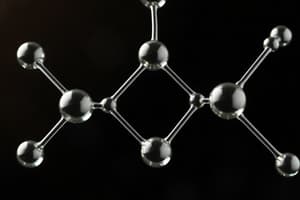Podcast
Questions and Answers
संयुक्त रासायनिक रसायन विज्ञान का क्या अध्ययन करता है?
संयुक्त रासायनिक रसायन विज्ञान का क्या अध्ययन करता है?
- को-ऑर्डिनेशन संयुक्तों की गुणवत्ता
- आयनिक रासायनिक संयुक्तों के संरचना और गुणधर्म (correct)
- मेटलोइड के गुण और व्यवहार
- तीन तत्वों से बने संयुक्त
संयुक्त धातु संरचना में कौन-कौन सी वस्तुएं कार्यरत होती हैं?
संयुक्त धातु संरचना में कौन-कौन सी वस्तुएं कार्यरत होती हैं?
- प्रोटीन और डीएनए
- मेटल धातु
- हाइड्रोजन (correct)
- प्रोटीन
अपरकर्बिक रासायनिक संयुक्त कौन-कौन सी स्विभावना में पाए जाते हैं?
अपरकर्बिक रासायनिक संयुक्त कौन-कौन सी स्विभावना में पाए जाते हैं?
- प्रोटीन, डीएनए, आमोनिया
- मोलेक्यूलर, मैक्रोमोलेक्यूलर, आयनिक (correct)
- तत्व, मेटल, मेटलॉइड
- मोलेक्यूलर, मैक्रोमोलेक्यूलर, ionic
अर्थशास्त्रीय रसायन विज्ञान क्या है?
अर्थशास्त्रीय रसायन विज्ञान क्या है?
प्रमुख अपरकर्बिक संयुक्त किसे कहलाते हैं?
प्रमुख अपरकर्बिक संयुक्त किसे कहलाते हैं?
किस कोणसा गुण समान्यत: संतृप्त रेखिक यौगिकों के साथ होता है?
किस कोणसा गुण समान्यत: संतृप्त रेखिक यौगिकों के साथ होता है?
कौन-कौन से क्षेत्रों में संतृप्त रेखिक रसायन प्रमुख भूमिका निभाते हैं?
कौन-कौन से क्षेत्रों में संतृप्त रेखिक रसायन प्रमुख भूमिका निभाते हैं?
जैव रसायन के क्षेत्र में क्या-क्या समाहित होता है?
जैव रसायन के क्षेत्र में क्या-क्या समाहित होता है?
विद्युतीय चालकता कौनसे प्रकार के रसायनों में होती है?
विद्युतीय चालकता कौनसे प्रकार के रसायनों में होती है?
परमाणु के मुख्य धारिता कौन-सी होती है?
परमाणु के मुख्य धारिता कौन-सी होती है?
रासायनिक रेखिकों में किस नामक विद्युतीय धारक होते हैं?
रासायनिक रेखिकों में किस नामक विद्युतीय धारक होते हैं?
रासायनिक अभिक्रिया के दौरान क्या परमाणुओं की अर्थव्यवस्था बदलती है?
रासायनिक अभिक्रिया के दौरान क्या परमाणुओं की अर्थव्यवस्था बदलती है?
संयुक्त रासायनिक रसायन विज्ञान क्या अध्ययन करता है?
संयुक्त रासायनिक रसायन विज्ञान क्या अध्ययन करता है?
संयोजन क्या है?
संयोजन क्या है?
मिश्रण क्या है?
मिश्रण क्या है?
रासायनिक प्रतिक्रिया क्या है?
रासायनिक प्रतिक्रिया क्या है?
रसायन विज्ञान क्यों महत्वपूर्ण है?
रसायन विज्ञान क्यों महत्वपूर्ण है?
Flashcards are hidden until you start studying
Study Notes
Introduction to Inorganic Chemistry
Inorganic chemistry, also known as inorganic science or inorganic chemistry, is a subfield of chemistry that studies the properties and behavior of inorganic compounds, which are chemical compounds that do not consist of carbon-carbon bonds. Inorganic chemistry is a vast and diverse field with numerous subdisciplines, including coordination chemistry, organometallic chemistry, solid-state chemistry, and biochemistry.
Inorganic Compounds
Inorganic compounds are substances that contain no carbon-carbon bonds. They can be divided into three main categories:
- Binary compounds: Compounds made up of two elements.
- Ternary compounds: Compounds made up of three elements.
- Quaternary compounds: Compounds made up of four or more elements.
Inorganic compounds can be ionic, molecular, or macromolecular in nature. They are typically composed of metals, nonmetals, or metalloids, and may also contain hydrogen. Examples of inorganic compounds include ionic compounds (salts), molecular compounds (water, ammonia), and macromolecular compounds (proteins, DNA).
Inorganic Chemistry Subdisciplines
Inorganic chemistry is a broad field with several subdisciplines, including:
- Coordination Chemistry: The study of the formation and properties of coordination compounds, which are compounds in which one or more ligands (electron-rich molecules or ions) are coordinated to a central metal atom or ion.
- Organometallic Chemistry: The study of compounds that contain a bond between a carbon atom and a metal atom.
- Solid-State Chemistry: The study of the structure and properties of solid inorganic compounds.
- Biochemistry: The study of chemical processes within living organisms, including the structure, function, and interaction of macromolecules such as proteins, lipids, polysaccharides, and nucleic acids.
Inorganic Compounds and Their Properties
Inorganic compounds can exhibit various properties, including:
- Electrical conductivity: Some inorganic compounds, like salts, conduct electricity when dissolved in water due to the presence of ions.
- Magnetic properties: Certain inorganic compounds, such as ferromagnets, exhibit magnetic properties due to the arrangement of electrons in their atoms.
- Optical properties: Inorganic compounds can have unique optical properties, such as reflectivity, transparency, or luminescence.
- Structural properties: The structure of inorganic compounds can vary greatly, from simple ionic lattices to complex coordination compounds, and understanding these properties is crucial for predicting their chemical behavior.
Inorganic Chemistry in Everyday Life
Inorganic chemistry plays a crucial role in our daily lives, with numerous applications in various industries:
- Medicine: Inorganic compounds are used in the production of pharmaceuticals and medical devices.
- Agriculture: Fertilizers and pesticides often contain inorganic compounds.
- Industrial processes: Inorganic compounds are used in the production of steel, cement, glass, and other industrial products.
- Energy production: Inorganic compounds are essential for generating electricity and producing solar energy.
Conclusion
Inorganic chemistry is a vast and diverse field that studies the properties and behavior of inorganic compounds. These compounds are essential for numerous everyday applications and play a crucial role in various industries. By understanding the properties and behavior of inorganic compounds, scientists and researchers can develop new materials, technologies, and solutions to address the challenges and opportunities of the modern world.
Studying That Suits You
Use AI to generate personalized quizzes and flashcards to suit your learning preferences.




